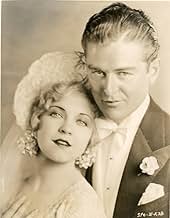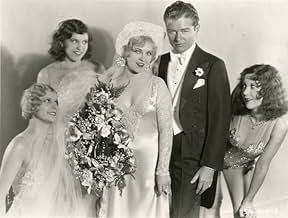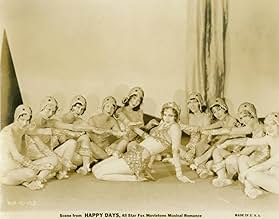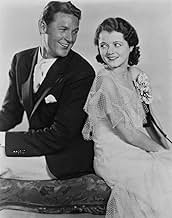Seems like every third sound film of 1929-1930 either was a musical or had a lot of musical numbers in it. Last night I finally decided to watch a musical I've had sitting around for over a year. I was very pleasantly surprised by the film! "Happy Days" (1929) advertises itself as a film with over 100 great entertainers. It certainly isn't bad for a Fox produced film. This one has as its main star Marjorie White, but it features Charles E. Evans and Richard Keene, but it also has in it: Will Rogers, George Jessel, Warner Baxter, Janet Gaynor, Charles Farrell, El Brendel, Victor McLaglen, Edmund Lowe, Stuart Erwin, James J. Corbett (yes, the boxer!), William Collier, Sr., Rex Bell, Walter Catlett, and I'm not finished. If you look in the chorus line, there's Betty Grable. Oh, did I mention Dixie Lee (at this time helping promote the career of her husband, Bing Crosby), Nick Stuart, Frank Albertson, 'Whispering' Jack Smith, Ann Pennington, J. Farrell MacDonald, Lew Brice, Sharon Lynn, Tom Patricola, Tom Kennedy, Lucien Littlefield, and I'm tired of writing these names...
Show actually is not just a revue, but revolves around a story. White's father, Charles E. Evans is captain of a Show Boat. It's going broke and he can't pay the piper. She decides she's going to New York to the night clubs and round up all the performers who had their beginnings with her pop on the boat and bring them back to the boat for a show to save the boat and her pop. Of course she only needs to go to one night club - at least it looks that way in the movie - and everybody wants to do his or her bit. It evidently works, because when the film ends, it's after the last number, with no thank yous, good byes, or "It's a success!". It just ends.
Best number by far is the Ann Pennington dance "Snake Hips", also with Sharon Lynn, followed by the Dixie Lee rendition of "Crazy Feet". Farrell and Gaynor sing a song that probably should have remained unsung. McLaglen and Lowe do a routine that jokes about their Quirt and Flagg routines in their soldier movies, though it never mentions Quirt and Flagg, only McLaglen and Lowe. Lots of other numbers and routines. Only one that was just plain stupid, and that was El Brendel. I know, some just love the guy. Oh, well, to each his/her own.
Highly recommended for those interested in the early sound musicals. This is basically Fox's answer to all the revues done in those first couple of years by the different studios. It's quite good. 80 minutes or just a few more. It won't grate if you know what you're getting into. For those only looking for "Singin' in the Rain" or "Cabaret", stay away or sit back and learn. If you look at the viewer ratings on the IMDb, they range from 1 star to 9. Most are 7 or 8, so most have enjoyed it; but there are certainly exceptions. For the record, the sound and the photography are spot on, not so much the creaky early stuff. Some of the songs aren't perfect in any sense by modern standards sound-wise, but for the day are quite decent. Much of the revue style music is straight on camera shots, but there are a few that seem precursors to Busby Berkeley. This is also the second film released in 70mm wide screen. It's the debut films of both Marjorie White and Betty Grable.





































